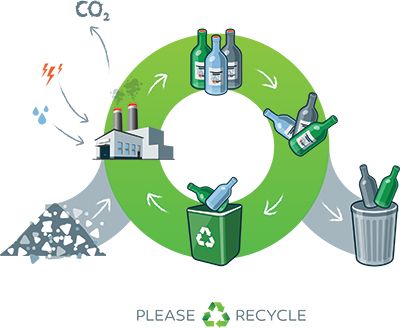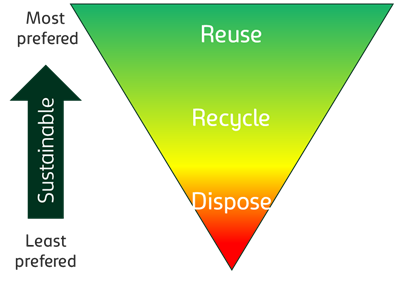 India is overburdened by the daily disposal of untreated waste, leading to limited space in landfills. Around 31 million tons[1], which is more than 70 per cent of India’s annual collected garbage, remains untreated; making it a concerning statistic. Today, glass is one of the primary domestic and business waste streams in the country.
India is overburdened by the daily disposal of untreated waste, leading to limited space in landfills. Around 31 million tons[1], which is more than 70 per cent of India’s annual collected garbage, remains untreated; making it a concerning statistic. Today, glass is one of the primary domestic and business waste streams in the country.
Glass is an inert material made from natural materials. If glass is not recycled, it can sit idle for years, taking up a lot of space in landfills. However, glass can be both recycled and reused repeatedly; and re-using it is one of the many ways we can help reduce pollution and minimise waste. That is not all, as reckless dumping of broken glass pieces along with trash, not only poses a threat on sanitation workers but also reduces the chances of reusing the material.
Reusable packaging is a great alternative to significantly reduce environmental impacts. One of the factors that need attention currently is the use of glass in consumer packaging and its implications to the environment. It might not be known to many that Returnable Glass Bottles (RGB) is the most environment-friendly consumer packaging available due to its resource efficiency and low carbon footprint. All one needs to do is to return the beer bottle in perfect condition to a bottle dealer or as per the regular waste disposal process. A circular loop exists, where the bottle is handed from the scrap dealer to various vendors and consolidators, and finally reaches the manufacturer. The bottle is then inspected at the breweries using advanced technology and cleaned under hygienic conditions to make it fit for reuse.
 However, implementing sustainable measures not only benefit the environment at large but also support the community we live in by providing employment at various levels.
However, implementing sustainable measures not only benefit the environment at large but also support the community we live in by providing employment at various levels.
In the alcobev industry, ‘Re-using’ is getting a gradual recognition in conversations with a focus on saving the environment, taking a step towards a more sustainable future. As a part of Carlsberg’s ambitious sustainability programme ‘Together Towards ZERO’, initiatives promoting ‘Zero Waste’ are in focus.
Keeping in mind the large impacts of primary glass production on the environment, it is environmentally favourable if used multiple times. Carlsberg’s focus on glass bottle reusage makes the beer bottles the lowest carbon impact packaging, which needs to be further improved by increasing the reuse. This can be simply done with each consumer taking ownership of returning a Carlsberg glass bottle, undamaged and intact.
Here is why we should focus on reusing glass bottles and their unmatched benefits – both for the environment and the community:
It saves energy and our precious natural resources: Producing new glass bottles is energy-intensive. With every reused bottle, the energy used to create a fresh bottle reduces by half as we can save on energy needed to melt the glass. This also results in conserving natural resources such as sand, limestone, etc.
Reduces greenhouse gas emissions: Carbon emissions can be reduced significantly by facilitating the return of glass bottles to collection centres. It saves raw materials, lessens the demand for energy, and cuts CO2 emissions. For instance, when a Carlsberg bottle is reused five times instead of three on an average in India, it significantly reduces the carbon footprint to less than one-fourth of the impact of a single-use glass bottle.
Less waste into landfills: Reusing glass bottles can help bring the numbers down by preventing the amount of discarded waste.
Creates an average of ten times more jobs: When you return a bottle through the usual waste disposal process, it passes onto multiple vendors across states, cities and districts, supporting more than 5,000 livelihoods. For example, in Rajasthan, ground-level vendors are engaged to collect all kind of scrap items like liquor, bottles washing, wastepaper, old plastic, metal, broken glass, among others, thus, employing more than 7,000 people in the region.
 Changing consumer behaviour is one of the critical factors to ensure all glass bottles are well-preserved for reusage to save energy that could then be put to better use for a sustainable future.
Changing consumer behaviour is one of the critical factors to ensure all glass bottles are well-preserved for reusage to save energy that could then be put to better use for a sustainable future.
Consumers are, therefore, encouraged to return each bottle in good condition to do their bit to reduce the climate impact. Every bottle counts.
[1]Waste management crisis in India – RECYCLING magazine (recycling-magazine.com)

